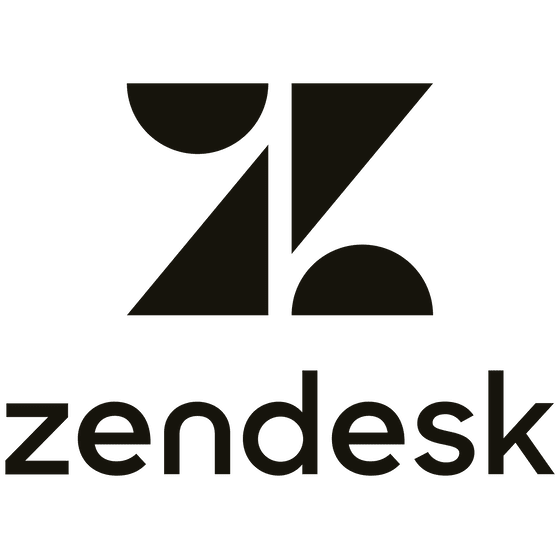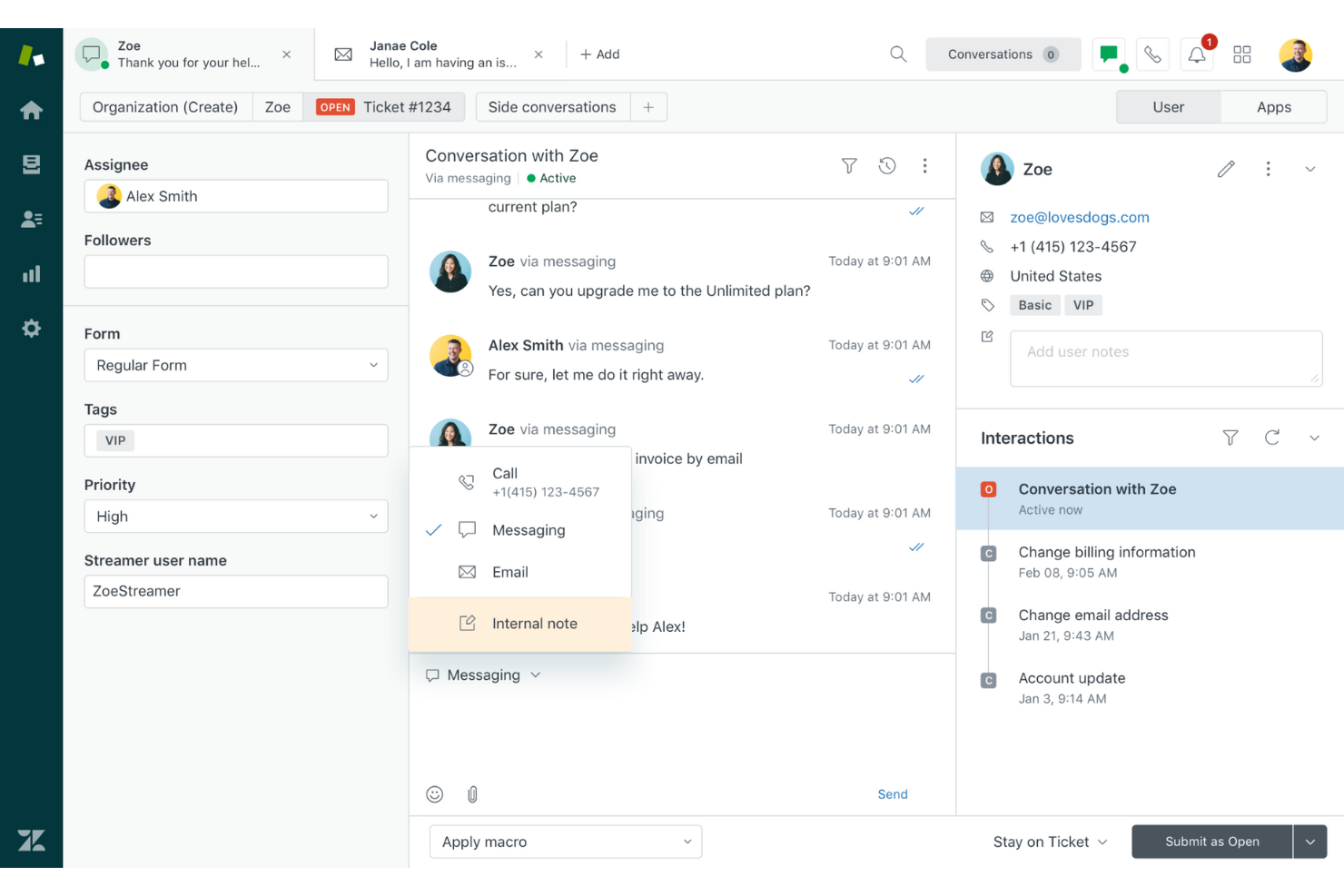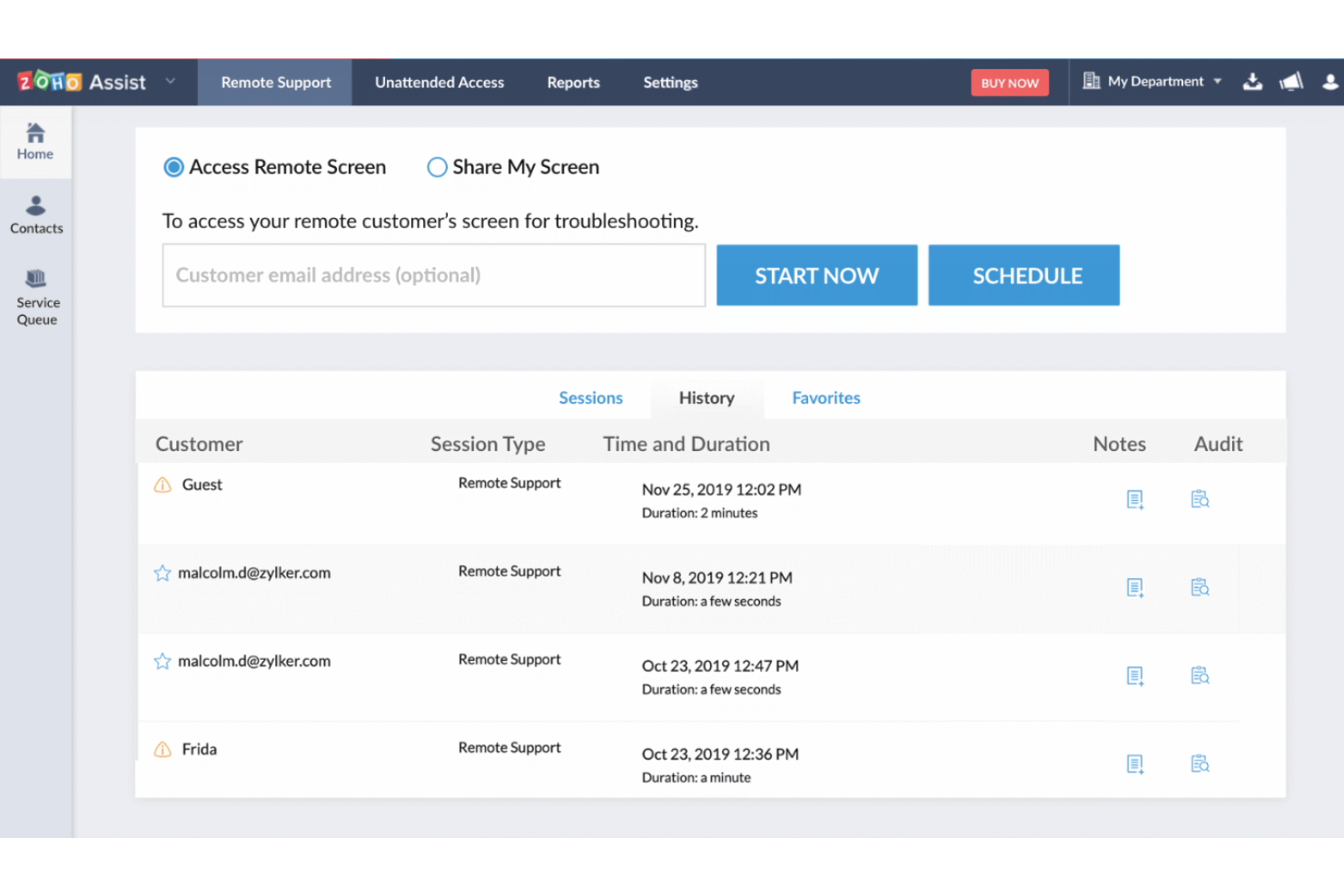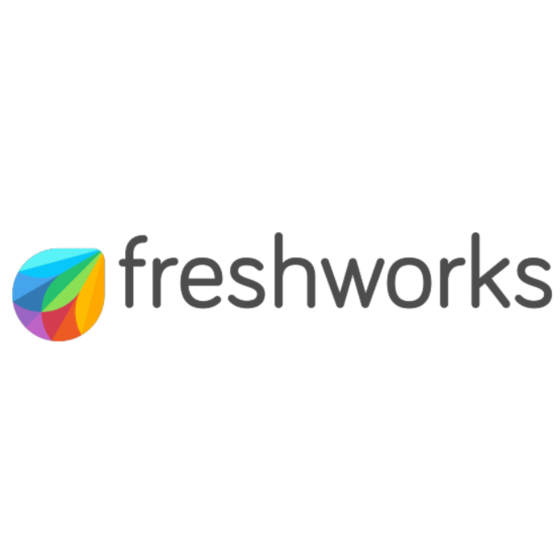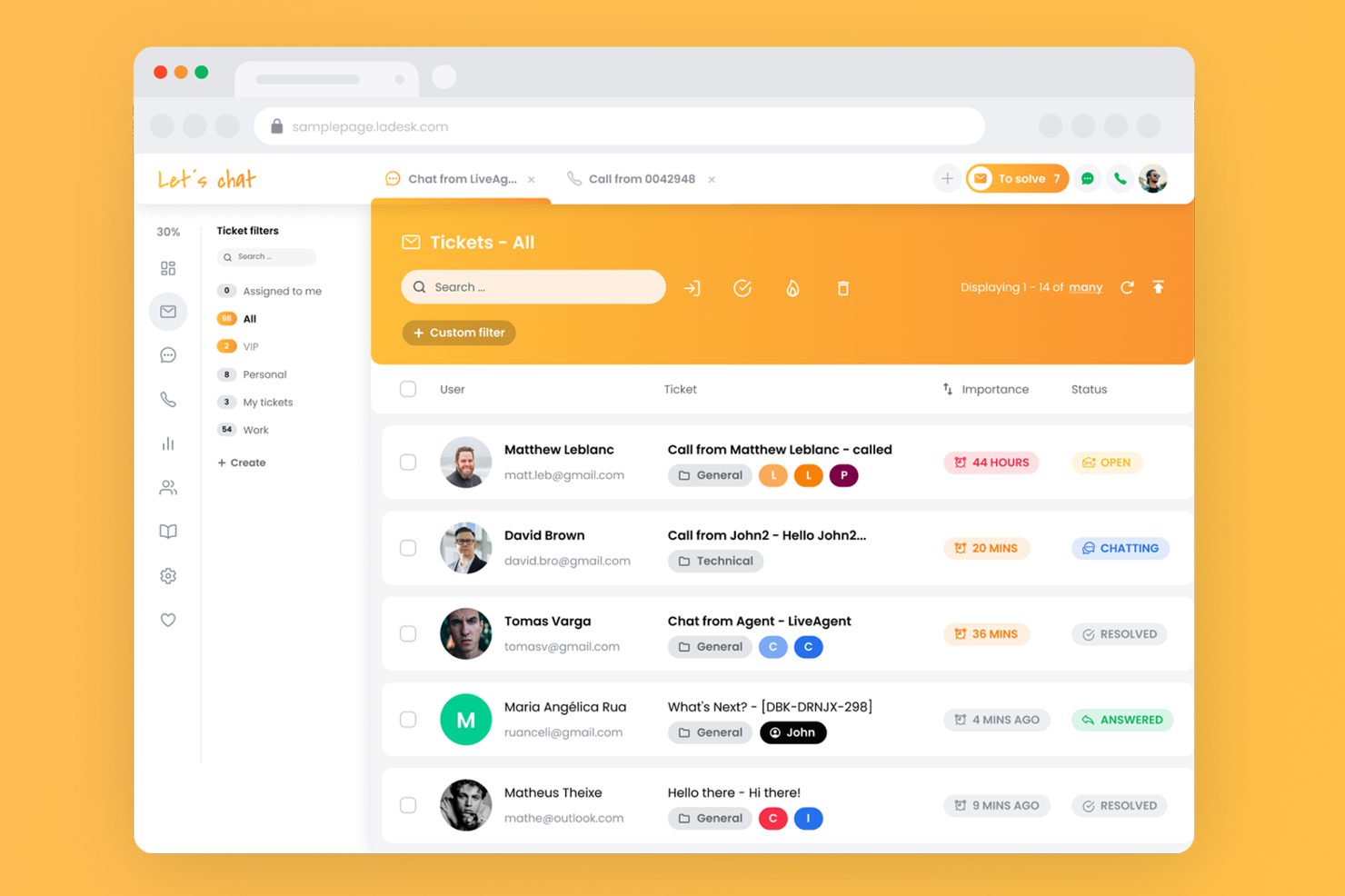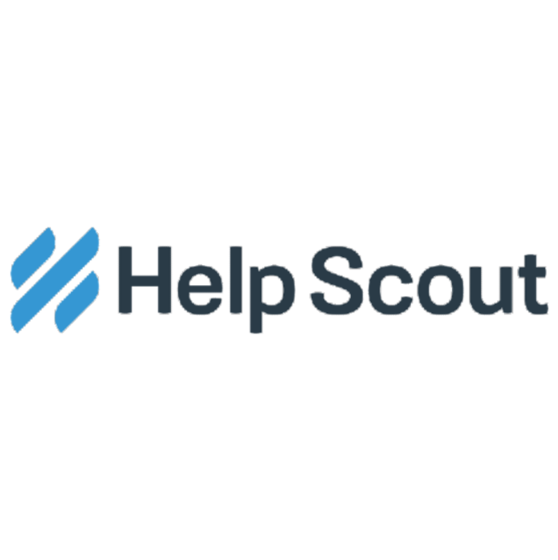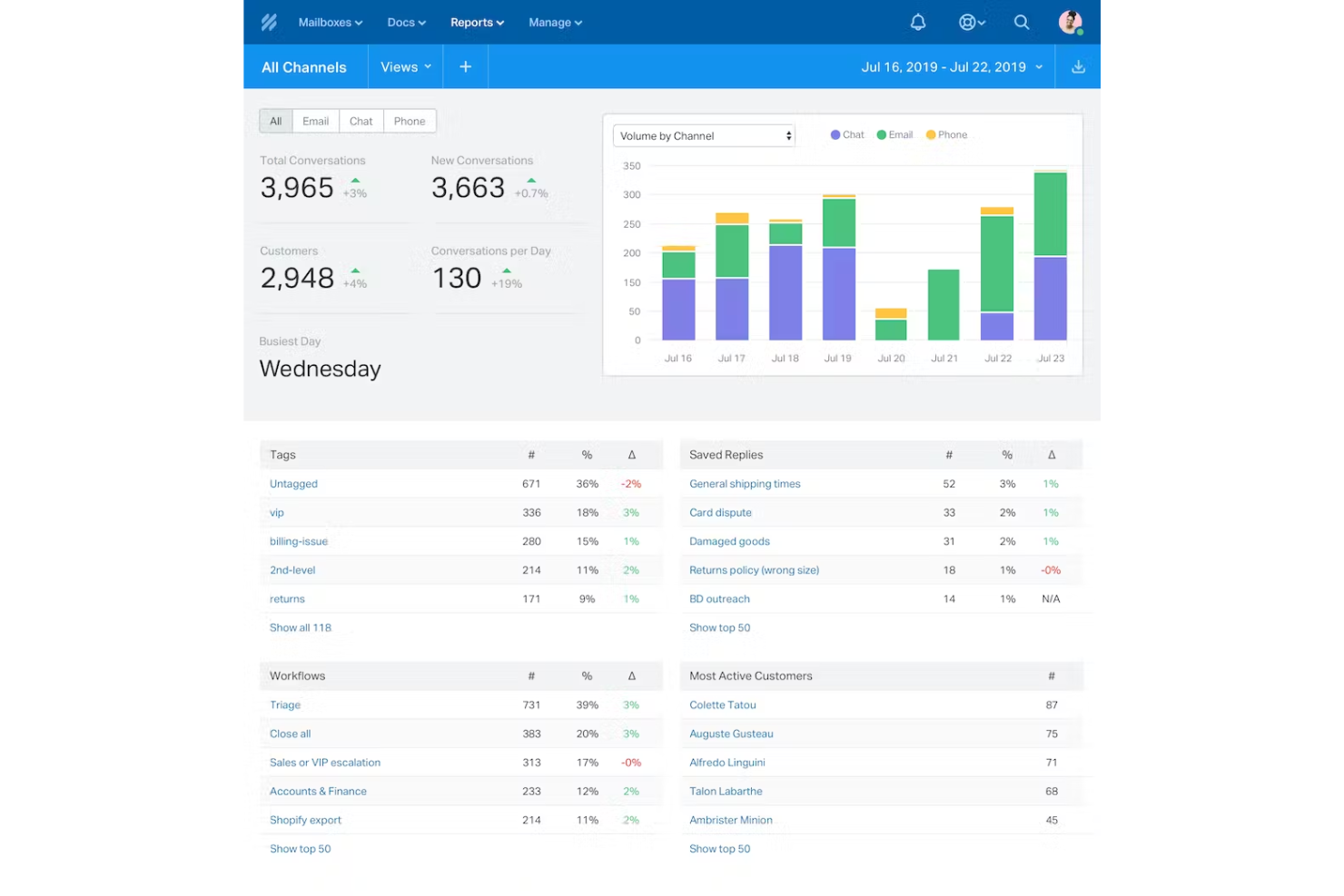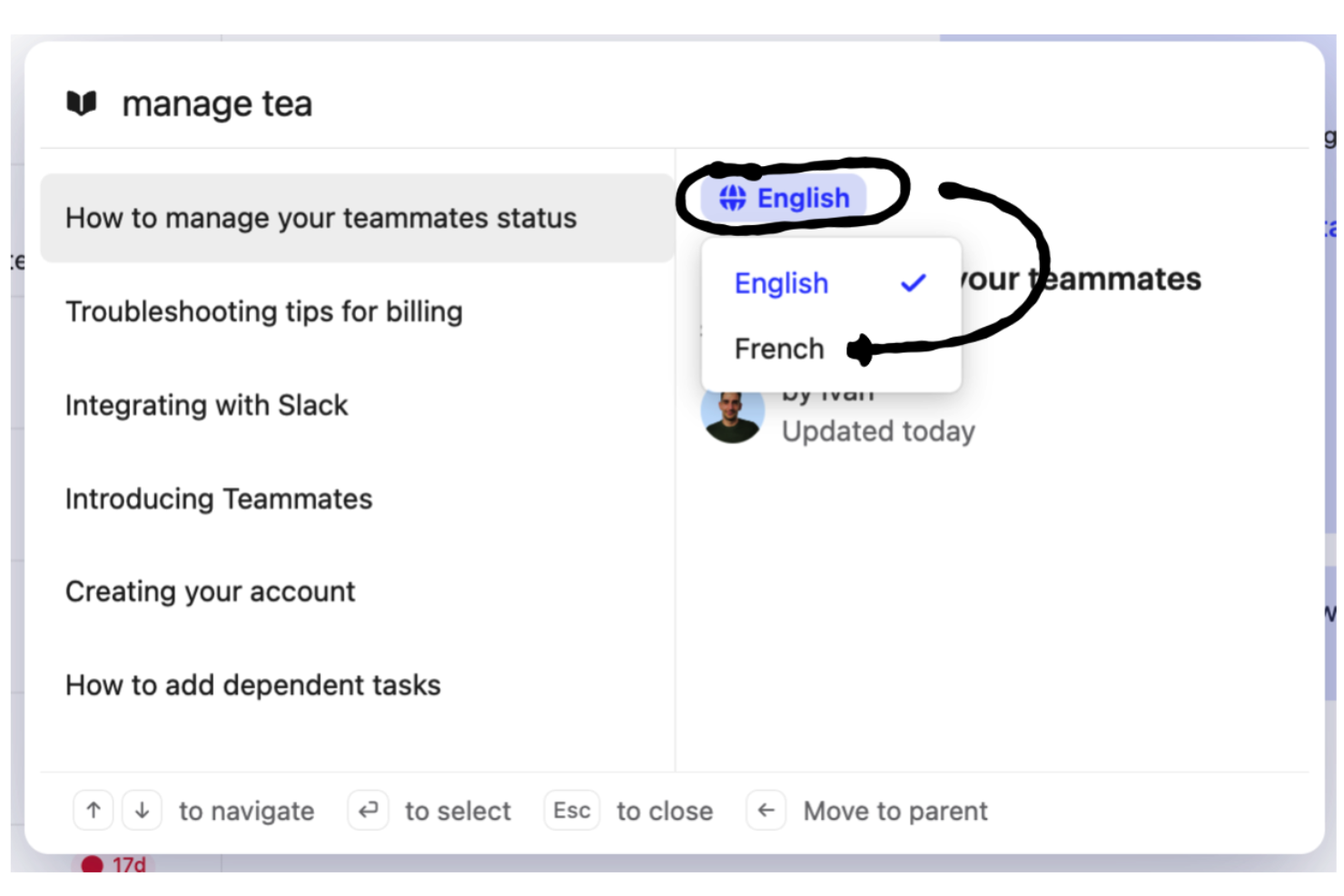10 Best Simple Help Desk Software Shortlist
Here's my pick of the 10 best software from the 22 tools reviewed.
With so many different help desk software available, finding the right one for you is tough — especially if you're looking for a simple help desk software. You know you want software to help you streamline your customer support and manage queries more efficiently, but you need to figure out which system is best. In this article, I'll help you make your choice easier by sharing my insights on the best simple help desk software to manage, track, and resolve customer queries quickly.
What is Simple Help Desk Software?
Simple help desk software is a hub for handling customer inquiries and providing support services for a company. They use ticket management tools to ensure customer interactions are neatly sorted, enabling service agents to address customer inquiries promptly using automated responses and other communication tools.
This type of software helps companies automate redundant tasks, improve teamwork, and increase customer satisfaction following positive service experiences. These cost-effective solutions also empower businesses to make decisions based on data analysis.
Overviews of the 10 Best Simple Help Desk Software Systems
Here are the tools I’ve evaluated that best fulfill the simple help desk software criteria:
Zendesk offers a user-friendly and adjustable platform for businesses to enhance customer experiences using AI and bots. This platform allows organizations to provide self-service portals, collect valuable insights, and deliver personalized client experiences.
Why I picked Zendesk: I decided to go with Zendesk for its customer support software that offers a wide range of features to enhance client interactions. They have a unified agent workspace that makes it easy for customers to communicate, AI and bots that automate responses for improved productivity, and self-service options that let clients find solutions on their own time.
Zendesk Standout Features and Integrations
Standout features include a comprehensive ticketing system that allows businesses to handle customer inquiries and issues efficiently. With messaging and live chat capabilities, real-time customer engagement is possible. Furthermore, an integrated help center and community forum empower customers to find self-service solutions and actively participate in discussions.
Zendesk Integrates with 1,200+ apps. Telephony and SMS integrations include AI customer service, Dialpad, and Viibe and Ada for support, Klaus and Nicereply for analytics and reporting, and Zendesk-built apps like Bookmarks and Print Ticket History.
Pros and cons
Pros:
- Omnichannel customer support
- Extensive integrations
- Includes agent productivity tools
Cons:
- Slight learning curve
- Free trial details are not transparent
Zoho Assist is a cloud-based remote support and remote access software. It helps you support customers from a distance through web-based, on-demand remote support sessions, and is compatible with the rest of the Zoho product suite.
Why I picked Zoho Assist: Whether or not you're using other Zoho products, this software works well as a help desk solution for providing remote access support. You can initiate live chats with customers or use voice or video chat. You can also transfer files to facilitate quicker resolutions, and schedule sessions as needed for providing customer support.
Zoho Assist Standout Features and Integrations:
Standout features include both on-demand and unattended remote support, which means you can help out your customers or team members whether they're at their computer or not. This feature helps you deploy remote updates in bulk and diagnose issues through remote access. You can also record remote sessions for record keeping, training, and auditing purposes.
Integrations include the Zoho product suite, Zendesk, ServiceNow, Slack, Microsoft Teams, Jira, Freshdesk, Spiceworks, and the Google Suite, among others.
Pros and cons
Pros:
- Ability to deploy bulk updates
- High-level security (SSL, 256-bit AES encryption, 2FA)
- On-demand and unattended remote access
Cons:
- Might not be ideal for non-Zoho users
- Some features may require coding knowledge
SysAid is an all-inclusive software for IT help desk that makes managing tickets, resolving issues, and handling assets easier by automating these processes. It's available either as a cloud-based or on-premises solution, and it offers exceptional technical support and training programs that are easy to understand. SysAid is perfect for businesses that need an uncomplicated and efficient IT service management solution that also works for other industries like HR and healthcare.
Why I picked SysAid: I chose SysAid because its self-service automation offers a comprehensive solution that includes automated password reset and one-click issue submissions. This empowers employees to independently resolve common IT problems, reducing their dependency on IT support staff and the need to create tickets.
SysAid Standout Features and Integrations:
Standout features include asset management that cross-references tickets, users, and assets for faster issue resolution. The software's remote control capability enables IT staff to troubleshoot devices remotely. Finally, SysAid's codeless configuration simplifies the setup process and makes the software user-friendly, even for users without coding expertise.
Integrations include Azure, ADFS, Bomgar, CAS, Jira Software – Cloud Service, Microsoft Teams, Nagios, Office 365, and Okta.
Pros and cons
Pros:
- Integrates with IT service management (ITSM)
- Easy to implement
- Includes task automation
Cons:
- Pricing not transparent
- Restricted customizations
Freshdesk is a powerful help desk that enables support teams to deliver effective and timely customer assistance through various channels. It allows businesses to handle various customer issues, from minor concerns to complex resolutions that require collaboration across multiple teams and timeframes.
Why I picked Freshdesk: I chose Freshdesk because of its exceptional ticket automation feature, which greatly improves response times and simplifies customer support procedures. By automating ticket management and routing, support teams can offer efficient and prompt assistance to customers through different channels.
Freshdesk Standout Features and Integrations:
Standout features include multichannel support where businesses can engage with customers across various channels. The software also provides a customer portal where customers can track their tickets and access helpful resources. Furthermore, Freshdesk can be tailored to meet the specific needs of each business, ensuring consistency and alignment with your brand identity.
Integrations include AI Smart Assist, Attachment Manager, Google Analytics, Mailchimp, Microsoft Teams, Salesforce, Shopify, Slack, TeamViewer, and WhatsApp. You can also integrate with 1,000+ apps on Freshdesk’s marketplace, spanning different categories like agent productivity, social media, reporting, and analytics.
Pros and cons
Pros:
- Can be scaled
- Comprehensive customization
- Omnichannel support
Cons:
- Slight learning curve
- No advanced reporting
LiveAgent helps businesses manage customer service across multiple channels. It offers various communication options like live chat, email, calls, social media, and a knowledge base. It’s ideal for businesses of any size looking to enhance customer engagement and satisfaction.
Why I picked LiveAgent: I was impressed by LiveAgent's gamification feature, which is not commonly found in help desk software. This feature utilizes game principles to motivate and reward agents' performance. Agents can earn badges and levels by accomplishing certain tasks. The system recognizes and displays agents' contributions on leaderboards, enabling them to compare their performance with colleagues. This method promotes productivity and enhances performance by creating a sense of competition among agents.
LiveAgent Standout Features and Integrations:
Standout features for LiveAgent include its universal Inbox, which consolidates all customer communication into one organized space by employing sophisticated automation rules. Also noteworthy is their video call feature, which offers a personalized and interactive customer support experience. Another essential feature is LiveAgent's time-tracking tool, which enables businesses to monitor the time spent on customer queries.
LiveAgent integrates with over 200+ popular applications, including CRMs like Highrise and Pipedrive, ecommerce platforms like Bigcommerce and Shopify, email marketing platforms like ActiveCampaign and Mailchimp, and social media platforms like Facebook and Instagram.
Pros and cons
Pros:
- Fast live chat widget
- Built-in call center
- Extensive integrations
Cons:
- No built-in VoIP
- No Whatsapp integration
Hiver is a platform that integrates with Gmail and helps businesses manage their customer support and communication across various channels like email, live chat, and WhatsApp. With its easy-to-use interface, it provides real-time tracking and assigns dedicated owners to queries, making it an ideal choice for businesses of any size.
Why I picked Hiver: Hiver stands out for its remarkable capability to turn Gmail into an all-encompassing communication and teamwork tool. Its effortless Gmail integration and easy-to-use interface remove the need to use numerous applications, and create a centralized hub to manage different customer support elements.
Hiver Standout Features and Integrations:
Standout features include an email management system that assigns emails to team members and keeps track of their progress to ensure that customer inquiries have clear ownership. Hiver offers advanced automation features such as rule-based email routing and email templates to simplify processes. It also promotes accountability by assigning specific team members as query owners and allowing for real-time tracking of query status.
Integrations include Aircall, Asana, Jira, Okta, QuickBooks, Salesforce, Slack, and WhatsApp. You can also connect Hiver to a paid Zapier account to unlock additional integrations.
Pros and cons
Pros:
- Comprehensive communications hub
- Includes reporting and analytics
- Easy to use
Cons:
- Rules automation only available in higher-priced plans
- Limited integrations
ProProfs Help Desk Software is a comprehensive customer support solution that streamlines communication and ticket management. It is suitable for businesses of all sizes.
Why I picked ProProfs Help Desk: I included their software for its high level of customization. Users can include their company branding, such as logos, and create custom fields to improve help desk ticketing.
ProProfs Help Desk Standout Features and Integrations:
Standout features include a robust ticket management system designed to efficiently handle all support tickets by routing them to the appropriate agents and prioritizing them accordingly. Unique to this tool is the Parent-Child Ticketing feature, which simplifies complex issues into manageable tasks for different teams to address.
Integrations include Microsoft Dynamics CRM, ProProfs Chat, ProProfs Knowledge Base, and Salesforce.
Pros and cons
Pros:
- Includes reporting and analytics
- Customizable interface
- Mobile app
Cons:
- Limited integrations
- No single user plan
Help Scout is a comprehensive help desk software designed to simplify and streamline customer service interactions. Its intuitive design makes it easy to use and set up, reducing the time spent on training users. With the ability to scale, it is versatile enough to meet the needs of any enterprise, large or small.
Why I picked Help Scout: I decided to include Help Scout because it has built-in features like private notes, collision detection, and assignments that make it easy for service teams to work together and manage multiple brands or products from a single account.
Help Scout Standout Features and Integrations:
Standout features include its vast knowledge base. This allows businesses to create a self-service site filled with helpful articles to address commonly asked questions. Additionally, Help Scout has real-time support options through its live chat and in-app messaging capabilities. Another useful feature is Help Scout's mailbox workflows, which allow users to automate or manually manage repetitive tasks.
Help Scout integrates with over 100 apps, including Asana, Intercom, Jira, Mailchimp, Salesforce, Shopify, Slack, Trello, WooCommerce, and WordPress.
Pros and cons
Pros:
- Easy to use
- Extensive integrations
- Includes reporting
Cons:
- Limited customization
- Jira integration exclusive to Plus plan
Intercom is a highly advanced help desk that utilizes AI to assist businesses in providing efficient, automated, and personalized customer support on a large scale. Its multilingual support capabilities make it an excellent choice for businesses with a global customer base.
Why I picked Intercom: I chose Intercom because it prioritizes automation in customer support. Its sophisticated automation tools allow businesses to handle repetitive tasks, freeing up time and resources for support teams to focus on more complex and critical issues. This automation extends to providing 24/7 global support by automating answers in 38 languages, even when the support team is not online.
Intercom Standout Features and Integrations:
Standout features include a unified interface and streamlined workflows that enhance productivity for users across all touchpoints. The custom bots have also been tailored to provide personalized and engaging customer interactions, encouraging more conversational and interactive exchanges.
Intercom integrates with over 350 tools, including CRM, email, social media, and databases. Key platforms include Delighted Inc, Helpshelf, Instagram, Jira Cloud, Mailchimp Subscribe, Salesforce, Segment, Stripe, and WhatsApp.
Pros and cons
Pros:
- Advanced support automation
- Includes reporting and insights
- Extensive integrations
Cons:
- No desktop app
- Multilingual support only available in higher-priced plans
HappyFox Help Desk is a web-based platform that provides a centralized solution for managing customer support requests. This versatile ticketing system efficiently tracks and handles inquiries from multiple channels and organizes them into a single system. It’s suitable for businesses of all sizes and industries.
Why I picked HappyFox: I decided to include HappyFox due to its intelligent rules engine which helps to automate complicated workflows and simplify support procedures. It allows users to set rules based on ticket properties, customer information, or time triggers to assign tickets, send notifications, and escalate issues.
HappyFox Standout Features and Integrations:
Standout features include a robust ticketing system for efficient tracking and resolution of support requests, a knowledge base that promotes self-service, and the ability to respond faster using canned actions. With reports, businesses can monitor, analyze, and improve their customer support.
Integrations include voice apps like Aircall and Dialpad, social apps like Facebook and Twitter, and native apps like HappyFox Chat and HappyFox Workflows. Other apps include Microsoft Teams, Okta SSO, Pipedrive CRM, and Salesforce.
Pros and cons
Pros:
- Supports live chat
- Easy customizations
- Multilingual help desk
Cons:
- No free trial
- Steep learning curve
The 10 Best Simple Help Desk Software Systems Comparison Chart
This comparison chart summarizes basic details about my selections for the best simple help desk software. You can view pricing details and the availability of free trials or demos side-by-side to help you find the best software for your budget and business needs.
| Tools | Price | |
|---|---|---|
| Zendesk | From $19/user/month (billed annually) | Website |
| Zoho Assist | From $12/month | Website |
| SysAid | Pricing upon request | Website |
| Freshdesk | From $18/user/month | Website |
| LiveAgent | From $9/user/month (billed annually) | Website |
| Hiver | From $15/user/month (billed annually) | Website |
| ProProfs Help Desk | From $30/user/month | Website |
| Help Scout | From $20/user/month | Website |
| Intercom | From $74/month (billed annually) | Website |
| HappyFox Help Desk | From $39/agent/month | Website |

Compare Software Specs Side by Side
Use our comparison chart to review and evaluate software specs side-by-side.
Compare SoftwareOther Options
Here are some more simple help desk tools that didn’t make the top list, but are still worth checking out:
- Front
Best for personalized customer support
- LiveAgent
Best for gamification features
- Gorgias
Best help desk software for ecommerce
- Zoho Desk
Best help desk software for businesses of all sizes
- Issuetrak
Best for omnichannel ticket submission
- Salesforce Service Cloud
Best for customer service management
- Spiceworks Cloud Help Desk
Best free help desk solution
- HubSpot Service Hub
Best for deepening customer relationships
- Vivantio
Best centralized help desk software
- ManageEngine
Best for IT help desk management
- SolarWinds Web Help Desk
Best ticketing help desk software
- Jira Service Management
Best for high-velocity service management
Selection Criteria for Simple Help Desk Software
Here’s a short summary of the main selection and evaluation criteria I used to develop my list of the best simple help desk software for this article:
Core Functionalities
To start my assessment of help desk software, I used recent market data to research various systems that can help teams handle customer inquiries and provide support services. To be considered for my review, the software needed to include the following capabilities:
- Features that make it simple for you to track, manage, and resolve any customer issues that may arise
- Capabilities to automate repetitive tasks
- A design that promotes collaboration among support staff
After making an initial list of potential candidates, I used the criteria below to narrow my choices. This helped me make accurate comparisons between each software system.
Key Features
In addition to the basic functionalities above, I also assessed the following key help desk features when selecting the best software for this list:
- Ticketing capabilities: The help desk ticketing system should enable users to create, assign, and track customer support tickets, ensuring that all customer inquiries are systematically organized and resolved promptly.
- Collaboration tools: This includes features like shared inboxes, internal notes, and simultaneous access to tickets, which can improve team coordination and speed up problem-solving.
- Knowledge management: Having a comprehensive knowledge base is crucial for your team to have easy access to information. It helps resolve issues quickly and encourages customers to use self-service options, which reduces the number of support tickets.
- Reports and analytics: The capability to examine data and produce reports is vital in making informed decisions. With this feature, businesses can keep tabs on team performance, gauge customer satisfaction, and pinpoint areas that require enhancement.
Usability
The software should be user-friendly and intuitive. It should require minimal training, offer easy navigation, answer FAQs, and provide a clean interface that enables agents to use it efficiently. The easier it is for your team to use the software, the quicker they can resolve customer inquiries.
Automation
Efficient support processes rely on automation. The software should be able to automate repetitive tasks like ticket categorization, assignment, and scheduling routine responses. This saves time and reduces human error, allowing support agents to handle more complex customer inquiries.
Customer Support
The help desk software provider should offer reliable customer support for all end-users. I looked for providers that offer 24/7 assistance, a thorough knowledge base, video tutorials, and live chat options.
Software Integrations
To ensure a smooth support process, it's important that the software can work well with other tools your company uses, like CRM systems, project management tools, email platforms, social media channels, and more. This is achieved through native integrations or strong API capabilities, which enable seamless integration and efficient sharing of data between platforms. By integrating these tools, you can simplify your support process, minimize manual work, and improve overall workflow efficiency.
Pricing
When selecting help desk software solutions, it's important to consider pricing that is competitive and can grow with your business. Some vendors even offer a free plan, which can be a great starting point, especially for smaller businesses or those on a tight budget. I tried to choose software with pricing models that are transparent and clearly outline what features are included at each level. It's important to strike a good balance between cost and functionality.
People Also Ask
Here are some answers to common questions you may have about help desk software:
How can help desk software help my business?
Using help desk software can improve customer service and communication. It centralizes inquiries and support tickets, streamlines communication channels, and offers team coordination and reporting capabilities. Ultimately, it leads to higher customer satisfaction, better team collaboration, and loyalty.
What are the main benefits of using help desk software?
The main benefits of using help desk software are:
- Workflow automation: Help desk software streamlines call routing and resolution for improved efficiency.
- An all-in-one view: You can access a single dashboard that displays all customer communications from different channels, service level agreements, customer history, and satisfaction data.
- Know your history: Help desk software keeps records of customer queries, facilitating smoother transfers and improving resolution times by storing relevant information in a central location.
- Delegation and prioritization: Help desk software automates repetitive requests.
How can I choose the right help desk software for my organization?
When choosing help desk software, consider your organization’s size, support volume, budget, and integration needs. Look for essential and advanced features like ticketing, a knowledge base, automation, chatbots, and reporting tools. Ensure the software is scalable, user-friendly, and integrates with your existing tools. Check for robust customer support and data privacy measures. Read reviews and try free trials to find the best fit for your needs.
If you’re ready to jump start your selection process, I recommend reviewing these tips to help you choose help desk software next.
What are the most important elements of a help ticketing system and why?
A helpful ticketing system should have several key features, including various ticket categories, support across multiple channels, support for multiple languages, effective management of the knowledge base, and informative data reporting dashboards.
Other Help Desk Software Reviews
Need help choosing a help desk solution for your business? Take a look at our related articles below to find the perfect fit for your business needs:
- 25 Best Help Desk Software
- 20 Best Online Help Desk Software
- 20 Best Help Desk Software for Small Business
- 10 Best Free Help Desk Software for CX Teams
- 10 Best Email Help Desk Software
Final Thoughts
Choosing the right help desk software is crucial for optimizing support processes and empowering your team to provide exceptional customer service. It's a strategic asset that can set your organization apart from the competition.
Stay up-to-date with the latest insights on customer experience and leadership by subscribing to our newsletter at The CX Lead.

